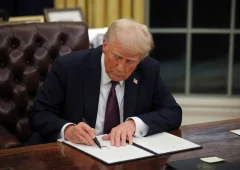Grayscale Pushes SEC for Green Light on Game-Changing Multi-Crypto ETF
Wall Street's crypto custody giant just lobbed a grenade at the SEC's resistance.
Grayscale's latest filing demands approval for a diversified crypto ETF—because apparently, watching Bitcoin-only products rake in billions wasn't painful enough for regulators.
The move comes as institutional investors increasingly treat crypto like a buffet rather than a single entrée. Why settle for Bitcoin when you can have Ethereum, Solana, and a side of regulatory headaches?
Insiders suggest the SEC's hesitation stems from that classic government combo: fear of innovation mixed with job security concerns. After all, what would Gary Gensler do with his days if he couldn't delay progress through endless 'consideration periods'?
Meanwhile, traditional finance dinosaurs whisper that crypto diversification is 'too risky'—right before shuffling back to their leveraged mortgage-backed security positions.
Legal timeline and procedural conflict
The proposal to list the fund on NYSE Arca was initially filed on October 15, 2024. On July 1, 2025, the SEC’s Division of Trading and Markets granted approval under delegated authority. However, later that same day, a Commissioner requested review, automatically triggering a stay under Rule 431(e).
Grayscale argues that while the stay may freeze decisions made under delegated authority, it cannot nullify the hard statutory deadline imposed by Congress. The firm points out that the SEC’s internal rules, including Rule 431, do not permit extensions beyond the 240-day limit for a final decision. According to Grayscale, failure to meet that deadline results in automatic approval by law.
Investors at risk as SEC delays decision
The asset manager warns that continued delays are actively harming the fund, the exchange, and existing investors. While considering a formal petition to lift the stay, Grayscale emphasized that the SEC should acknowledge the fund’s approval as automatic under federal law.
READ MORE:
The letter also highlighted concerns that the Commission has previously used similar procedural tactics to stall other proposals, often with no follow-up for months or years. Grayscale called these delays unacceptable and inconsistent with the spirit of the Dodd-Frank reforms that established the 240-day rule.
Pushing for clarity in crypto regulation
Despite its frustrations, Grayscale acknowledged recent SEC efforts to improve crypto regulation, including the formation of a dedicated Crypto Task Force. The firm expressed its desire to work cooperatively with the agency and continue serving as a resource in shaping clear, investor-friendly digital asset policies.
![]()


